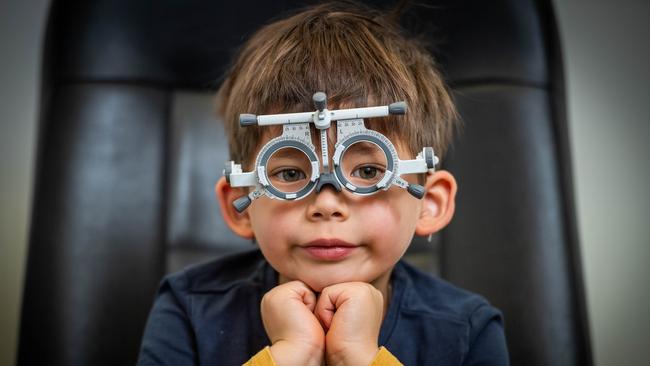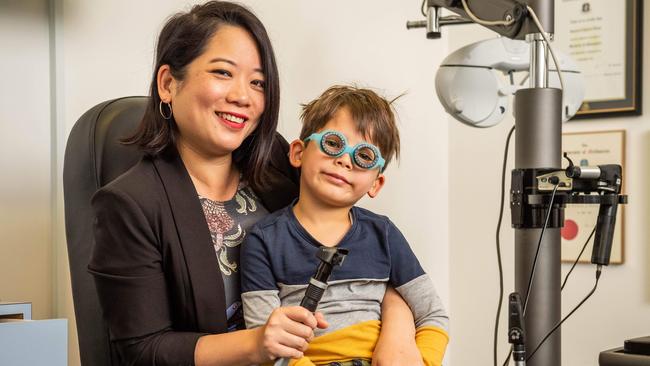Teen screen addictions ‘damage kids for a lifetime’, doctors warn
Cranky, clumsy and shortsighted – with risks of autism. Aussie parents have been warned of the risks of kids becoming addicted “screenagers”.
National
Don't miss out on the headlines from National. Followed categories will be added to My News.
Exclusive: “Screenagers” who spend a third of their waking hours glued to screens are growing shortsighted, clumsy and even showing signs of autism, medical experts have warned.
Online obsessions are triggering eating disorders, anxiety, depression and aggression among a generation of children who spend more time playing in cyberspace than in the real world.
Australian Medical Association (AMA) vice-president Dr Chris Moy said doctors are worried by rising rates of obesity and mental illness among children.
“Too much screen time may damage kids for a lifetime,’’ he said.
“When children are spending too much time in front of screens instead of playing sports or being physically active, that is a health risk.’’
Parents are being urged to balance “screen time with green time’’, to prevent children growing shortsighted.

Optometry Australia chief clinical officer Luke Arundel said children need to spend time looking in the distance, and in sunlight, for their eyeballs to grow properly.
“It’s not just about kids wearing glasses – the concern is that high myopia can cause problems resulting in permanent vision loss and they are more likely to get glaucoma or cataracts,’’ he said.
Melbourne optometrist Sophie Koh said children can reduce the risk of short-sightedness by spending two hours a day outdoors in natural daylight.

Psychologist Dr Esben Strodl, who is associate professor and clinic co-ordinator at the Queensland University of Technology School of Psychology and Counselling, has warned that babies and toddlers left to watch TV or iPads may grow up with symptoms of autism.
Dr Strodl was part of a Chinese-funded study of more than 29,000 children, published in the journal Psychology Health and Medicine last year, which found that “screen exposure in early life might increase the occurrence of autistic-like behaviours among preschoolers’’.
He said children who spent more than an hour a day watching screens before the age of three are more likely to show signs of autism before starting school.
He said babies and toddlers who spend too much time watching screens could grow up to be “very sensitive to touch and sounds, they might not have the same facial expressions, they might use monotone speech, or have some impairment in their language’’.
Slouching over screens is also causing headaches and back and neck pain for children, who are literally growing “horns’’ on their spines.
Australian researchers Mark Sayers, an associate professor of sports biomechanics at the University of the Sunshine Coast, and chiropractor Dr David Shahar made international headlines in 2016 when they discovered lumps – dubbed “phone bones’’ – growing on the spines of university students.
Associate Professor Sayers said poor posture was now more common among university students than normal posture.
He said the bone spurs detected on students’ X-rays were usually only seen in elderly patients.
“If you’re getting someone in their 20s presenting with these postures, what are they going to look like when they’re 50?’’ he said.
Australian Physiotherapy Association spokeswoman Nicole Tait said unfit and sedentary children are suffering more injuries.
“Children across all age groups have declined in strength and fitness and flexibility,’’ she said.

A new survey of Gen Z’s, aged 15 to 25, reveals they spend five hours a day glued to their smartphone screens – with half feeling they are “addicted to social media’’.
Dr Moy said addiction to online gaming and the internet was a “serious health issue comparable with addictions to drugs and alcohol’’.
He said children aged five to 17 should not spend any more than two hours a day on screens – with a limit of one hour for younger children.
But only a third of children aged five to 12, and 20 per cent of teenagers, met the national guidelines for screen time.
Among Gen Zs, one in five males and 6 per cent of females are gaming for three or more hours a day, based on a new survey of 1232 young Australians aged 15 to 24 by school-leaver service Year13.
Another 19 per cent of males and 8 per cent of females spent an hour or two each day playing online games.





